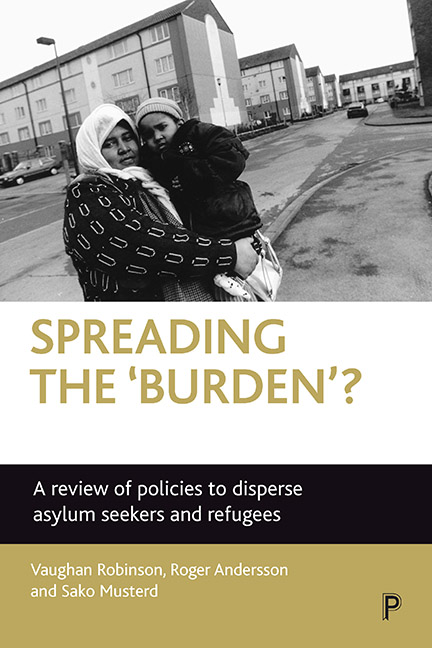Book contents
- Frontmatter
- Contents
- List of tables and figures
- Acknowledgements
- Glossary
- one Introduction
- two Defining the ‘problem’
- three Dispersal policies in the Netherlands
- four Dispersal policies in Sweden
- five Dispersal policies in the UK
- six What works? Improving the efficiency and effectiveness of dispersal
- seven Redefining the ‘problem’ and challenging the assumptions
- References
- Index
- Also available from The Policy Press
six - What works? Improving the efficiency and effectiveness of dispersal
Published online by Cambridge University Press: 20 January 2022
- Frontmatter
- Contents
- List of tables and figures
- Acknowledgements
- Glossary
- one Introduction
- two Defining the ‘problem’
- three Dispersal policies in the Netherlands
- four Dispersal policies in Sweden
- five Dispersal policies in the UK
- six What works? Improving the efficiency and effectiveness of dispersal
- seven Redefining the ‘problem’ and challenging the assumptions
- References
- Index
- Also available from The Policy Press
Summary
The need for evidence
There is no doubt that over the past five years there has been a significant shift towards evidence-based policy. The government has been forced to abandon its conviction-based policies in favour of this sound base for new initiatives. Why? The reasons are many: increased scepticism among a more educated and questioning electorate; the greater availability of relevant social science knowledge; more frequent and intense lobbying by interest groups; rising pressure for public accountability (Davies et al, 2000). In the UK, the government has been particularly keen on this trend. The Social Exclusion Unit, the Performance and Innovation Unit and the Centre for Management and Policy Studies have all been established to ensure that policy making is modernised and based upon the rational principles espoused in the seminal document, Professional policy making for the twenty-first century (Cabinet Office, 1999). That document introduced a modern vocabulary to public policy making. Future policies were to be ‘strategic’, ‘outcome-focused’, ‘joined up’, ‘inclusive’, ‘robust’, ‘flexible’ and ‘innovative’. Beyond this, it should also ‘learn from experience’ and be rooted in ‘evidence’. However, this new departure has not been without teething problems. For example, what constitutes ‘evidence’? What relative weight should be accorded to each types of evidence? And is the decision-making process really as rational as this school of thinking assumes (Nutley and Webb, 2000)? And yet there is much agreement that policy making should focus on ‘what works’. David Blunkett, then Minister for Education and Employment, declared:
Social science should be at the heart of policy making. We need a revolution in relations between government and the social research community – we need social scientists to help to determine what works and why, and what types of policy initiatives are likely to be most effective. (Blunkett, 2000)
This chapter draws upon the evidence base presented in Chapters Three, Four and Five of this volume. It distills the principles that are critical to the success of dispersal policies and the elements that are critical to their successful implementation. (This discussion assumes that dispersal policies are desirable and justified, points that will be considered further in Chapter Seven.)
- Type
- Chapter
- Information
- Spreading the 'Burden'?A Review of Policies to Disperse Asylum Seekers and Refugees, pp. 149 - 158Publisher: Bristol University PressPrint publication year: 2003



